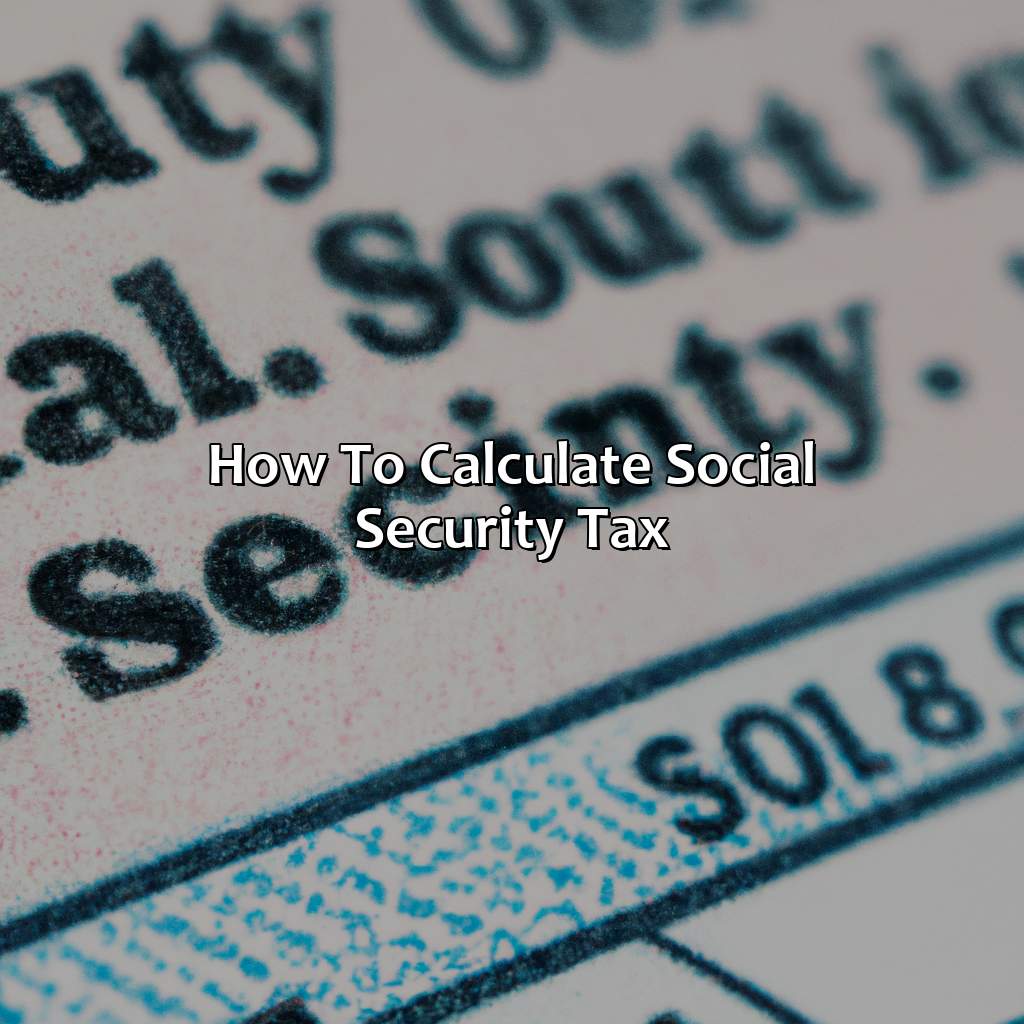What Is The New Social Security Rate?
Key Takeaway:
- The Social Security rate is a tax that funds the Social Security program for retirement, disability, and survivor benefits.
- For 2021, the Social Security tax rate for employees is 6.2%, while the rate for self-employed individuals is 12.4%.
- To calculate Social Security tax, individuals should be aware of maximum taxable earnings, Social Security wage base limit, and the Social Security tax cap.
- The benefits of paying Social Security tax include retirement benefits, disability benefits, and survivor benefits.
Confused about the new Social Security rate? You are not alone. Many people have questions about the recent changes and the impact they will have on their finances. Learn how to calculate your new Social Security rate and secure your financial future.
What is Social Security Rate?
Social Security Rate refers to the percentage of an employee’s wages that is deducted by the government to fund the Social Security program. This program provides retirement, disability, and survivor benefits to eligible individuals. The new Social Security Rate for the year 2021 is 6.2% of an employee’s income up to $142,800.
In addition to retirement benefits, the Social Security program also provides survivor and disability benefits to eligible individuals. The program is funded through payroll taxes paid by employees and employers. For the year 2021, the Social Security Rate remains unchanged at 6.2% for employees and employers. Self-employed individuals are required to pay the full 12.4% rate to fund the Social Security program.
It is important to note that the Social Security Rate only applies to wages earned up to a certain amount each year. For the year 2021, this maximum amount is $142,800. Any wages earned above this amount are not subject to the Social Security tax.
To maximize Social Security benefits, it is recommended that individuals delay claiming their benefits until they reach full retirement age. Additionally, working for a longer period of time and maximizing earnings can also increase Social Security benefits. Understanding the Social Security Rate and how it is calculated can help individuals make informed decisions regarding retirement planning and maximizing their benefits.

Image credits: retiregenz.com by James Woodhock
New Social Security Rate for 2021
Social Security Rate Changes for 2021
The Social Security rate has been updated for the year 2021. It is imperative to understand the latest rate to plan finances effectively. This article will provide all the necessary details regarding the recent change in the Social Security rate.
The new Social Security contribution rate for 2021 has increased to 12.4%. This rate includes both the employer’s and employee’s contribution. The maximum taxable earnings limit for Social Security taxes has also increased to $142,800. This means that the income above this threshold will not be subject to Social Security taxes.
It is essential to note that these changes can significantly affect your paycheck and retirement benefits. It is advisable to consult a financial advisor to plan accordingly.
Fear of missing out on the latest Social Security rate updates can lead to significant financial setbacks. Being aware of these changes allows you to prepare and avoid any potential hurdles that may arise. Stay informed to secure your financial future.

Image credits: retiregenz.com by Harry Duncun
How to Calculate Social Security Tax
In today’s world, it is essential to know how to calculate the social security tax properly. Knowing the new social security rate is crucial to ease a person’s financial burdens when planning long-term financial goals, saving for retirement, or even purchasing a new home. Here’s a step-by-step guide to help you calculate your social security tax:
- Determine your taxable income.
- Calculate your social security taxable earnings.
- Determine your social security tax rate.
- Calculate your actual social security tax.
One unique detail to note is that the maximum taxable earnings have been raised to $142,800 for this year, affecting high-income earners’ social security tax calculations.
To avoid missing out on your social security benefits, ensure accurate calculations by following these steps. Use online calculators or hire financial advisors to have a clear understanding of your social security tax rates.
Take charge of your financial future and ensure accurate social security tax calculations to avoid missing out on valuable benefits.

Image credits: retiregenz.com by Yuval Duncun
Benefits of Social Security Tax
Advantages of Paying Social Security Tax: Financial and disability benefits, reduced Medicare premiums, and automatic cost-of-living adjustments. Social security tax is capped and was implemented in 1935 by President Franklin D. Roosevelt for economic security.
Image credits: retiregenz.com by Harry Jones
Some Facts About the New Social Security Rate:
- ✅ The new Social Security rate for 2021 is 6.2% for employees and 6.2% for employers. (Source: IRS)
- ✅ The Social Security wage base for 2021 is $142,800. (Source: Social Security Administration)
- ✅ Self-employed individuals pay the full 12.4% Social Security tax, but can deduct half of this amount on their tax returns. (Source: IRS)
- ✅ Social Security benefits are adjusted annually for inflation. (Source: Social Security Administration)
- ✅ The Social Security trust fund is predicted to run out of money by 2034, after which benefits may be reduced. (Source: Social Security Administration)
FAQs about What Is The New Social Security Rate?
What is the new social security rate?
The new social security rate for 2021 is 6.2% for employees and 12.4% for self-employed individuals, which is the same as the rate in 2020.
Has the social security rate increased?
No, the social security rate has not increased. It remains the same as the rate in 2020, which is 6.2% for employees and 12.4% for self-employed individuals.
Is there a maximum income level for social security taxes?
Yes, for 2021, the maximum taxable earnings for social security taxes is $142,800.
Is social security tax the same as Medicare tax?
No, social security tax and Medicare tax are not the same. Social security tax is 6.2% for employees and 12.4% for self-employed individuals, while Medicare tax is 1.45% for employees and 2.9% for self-employed individuals.
What happens if I earn more than the maximum taxable earnings for social security taxes?
If you earn more than the maximum taxable earnings for social security taxes, which is $142,800 for 2021, you will not have to pay social security taxes on the additional earnings. However, you will still have to pay Medicare taxes at a rate of 1.45% for employees and 2.9% for self-employed individuals.
Can I opt-out of paying social security taxes?
No, you cannot opt-out of paying social security taxes. It is a mandatory tax that funds the social security program, which provides retirement, disability, and survivor benefits to eligible individuals.


